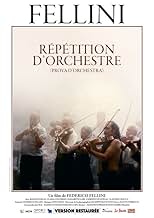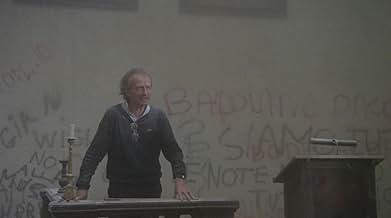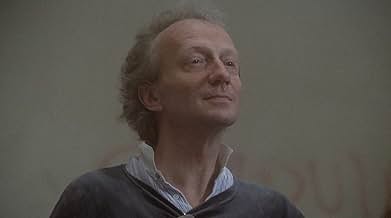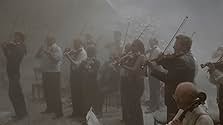ÉVALUATION IMDb
7,1/10
5,4 k
MA NOTE
Un orchestre se réunit pour une répétition dans une ancienne chapelle sous les yeux inquisiteurs d'une équipe de télévision, mais un soulèvement éclate.Un orchestre se réunit pour une répétition dans une ancienne chapelle sous les yeux inquisiteurs d'une équipe de télévision, mais un soulèvement éclate.Un orchestre se réunit pour une répétition dans une ancienne chapelle sous les yeux inquisiteurs d'une équipe de télévision, mais un soulèvement éclate.
- Prix
- 1 victoire et 2 nominations au total
Nando Villella
- Cello player
- (as Ferdinando Villella)
Franco Javarone
- Bass tuba player
- (as Giovanni Javarone)
Andrew Lord Miller
- Oboe player
- (as Andy MIller)
Cesare Martignoni
- Clarinet player
- (as Cesare Martignon)
Filippo Trincia
- Head of orchestra
- (as Filippo Trincaia)
Avis en vedette
This movie is one of my all-time favourites: through the "metaphor" of music, a universal picture of a power struggle is shown. Although this may appear 'thin', many layers of this struggle are peeled off. The German (looking) conductor appears to portray an easy comparison to Adolf Hitler, but another could be to Herbert von Karajan, the dictatorial conductor of the Berliner Philharmoniker. And then there is the great music score, that still lingers in my head, although I have not been able to find a recording of it (CD/LP?)(after almost 30 years!). I saw this movie again some years ago and it does not look dated. While I am not a Fellini adept and this movie was seen as one of his minor ones, this is a real classic to me.
This miniature movie's tempo builds, stops and starts in that comical, jerky way characteristic of Fellini. It's one of the things I like.
The interviews are a riot!
It appears to be a parable of the last few hundred years of European history.
The interviews are a riot!
It appears to be a parable of the last few hundred years of European history.
While the movie analyzes the roots and resolution of social revolt, what I like the most about it, is the personalized world-view of the musicians, as well as an exceptional music drive. My favorite Fellini and Rota. 10/10.
Perhaps not your usual Fellini film, if there is such a thing, but, made between his Casanova (1976) and City of Women (1980), this is an intriguing if rather short and enigmatic piece. Ostensibly a documentary but almost as soon as the musicians begin turning up, all does not seem to be quite as expected. Has the director really found an orchestra with so many oddball characters? Is the German conductor a fascist dictator in disguise? Are the proceedings really to be monitored by a trade union shop steward? Is this more a comment upon Italian politics of the time than a showcase for music? All may be revealed to each upon his or her own viewing and interpretation but for me it is a brave and amusing piece that perhaps loses a fair bit without awareness of the considerable turmoil within Italy at the time. One of the most interesting elements happens to be that Nino Rota wrote the music that is rehearsed and then performed within the film and that it was one of the last things he did before dying the following year, having scored around 150 films including almost every single one for Federico Fellini.
In most of Federico Fellini's best films, he made big statements about the way we live and socialize with each other and deal with ourselves as much as the past, all within exciting, tragic-comic film-making style. Orchestra Rehearsal does the same, though in a shorter amount of time. We are given a (union) orchestra in Italy, who's members vary from young adults to the old timers, women, introverts, trouble makers, and so forth, who each have their own music of choice (or sometimes of necessity). The conductor is frustrated- he can barely get the orchestra to concentrate much less really practice, and the union problems get things caught in the way as they rip through the ironically happy and (typically) carnival-like pieces. There's a break taken, which is when everything starts to slowly, but surely, wind down and breakdown among the musicians. In the meantime a television crew stands by taking 'interviews' of the musicians, their opinions, their little 'off' moments, signaling the anarchy that will soon ensue.
The interviews themselves are some of the strongest, funniest parts of the film- the interviewers get (sometimes begrudgingly) words on their instruments, why they play, how they play, and what role their music has in the world. These interviews can also be hit-or-miss sometimes, and because of the constant dialog (there's sometimes barely a breath to be had, as is the beautiful claustrophobic style in Fellini's characters), there's almost too much information going on. There's also the tendency for the character(s), whom are mostly portrayed by un-professionals (to acting, not to music of course), to not be very convincing, or even a little boring (the conductor's monologue in his room, for example, is one of the weaker parts of the film for me). But then it does start to pick up in insane, trademark Fellini fashion as the musicians rebel, and an unexpected surprise comes heading their way.
It's likely that Orchestra Rehearsal isn't one of Fellini's very best films, but it is one that captivates as it bemuses, brings laughs as it does thought, and it isn't necessarily a wasteful experience (some may not like it much at all, at least in comparison to his masterpieces). Not to forget the incalculable, lasting power of Nina Rota's music, which drives the film's bombastic, heart-racing rehearsing scenes (there is also humor underneath much of the music, like when the musicians have their own little solos as jokes). There's something always satisfying when a composer is on the same page as the director he's writing for, and few were ever so in tune as Fellini and Rota. And even during some parts that don't add up, their combination helps out a lot. As mentioned before, one could even think deeper into the ideas and thoughts and characters in the film as almost a microcosm of society itself, its easy-going people, its hard-nosed people, its incendiaries, its nostalgics, and its normals and eccentrics. Or, one can just take the Fellini ride, so to speak, and enjoy some 70 minutes with Fellini & company.
The interviews themselves are some of the strongest, funniest parts of the film- the interviewers get (sometimes begrudgingly) words on their instruments, why they play, how they play, and what role their music has in the world. These interviews can also be hit-or-miss sometimes, and because of the constant dialog (there's sometimes barely a breath to be had, as is the beautiful claustrophobic style in Fellini's characters), there's almost too much information going on. There's also the tendency for the character(s), whom are mostly portrayed by un-professionals (to acting, not to music of course), to not be very convincing, or even a little boring (the conductor's monologue in his room, for example, is one of the weaker parts of the film for me). But then it does start to pick up in insane, trademark Fellini fashion as the musicians rebel, and an unexpected surprise comes heading their way.
It's likely that Orchestra Rehearsal isn't one of Fellini's very best films, but it is one that captivates as it bemuses, brings laughs as it does thought, and it isn't necessarily a wasteful experience (some may not like it much at all, at least in comparison to his masterpieces). Not to forget the incalculable, lasting power of Nina Rota's music, which drives the film's bombastic, heart-racing rehearsing scenes (there is also humor underneath much of the music, like when the musicians have their own little solos as jokes). There's something always satisfying when a composer is on the same page as the director he's writing for, and few were ever so in tune as Fellini and Rota. And even during some parts that don't add up, their combination helps out a lot. As mentioned before, one could even think deeper into the ideas and thoughts and characters in the film as almost a microcosm of society itself, its easy-going people, its hard-nosed people, its incendiaries, its nostalgics, and its normals and eccentrics. Or, one can just take the Fellini ride, so to speak, and enjoy some 70 minutes with Fellini & company.
Le saviez-vous
- GaffesWhen they are interviewing the first violinists, the harpist in the background is clearly not playing but harp music is audible.
- ConnexionsFeatured in In Search of Fellini (2017)
Meilleurs choix
Connectez-vous pour évaluer et surveiller les recommandations personnalisées
- How long is Orchestra Rehearsal?Propulsé par Alexa
Détails
- Date de sortie
- Pays d’origine
- Langues
- Aussi connu sous le nom de
- Orchestra Rehearsal
- Lieux de tournage
- sociétés de production
- Consultez plus de crédits d'entreprise sur IMDbPro
- Durée1 heure 12 minutes
- Mixage
- Rapport de forme
- 1.37 : 1
Contribuer à cette page
Suggérer une modification ou ajouter du contenu manquant

Lacune principale
By what name was Prova d'orchestra (1978) officially released in India in English?
Répondre



























